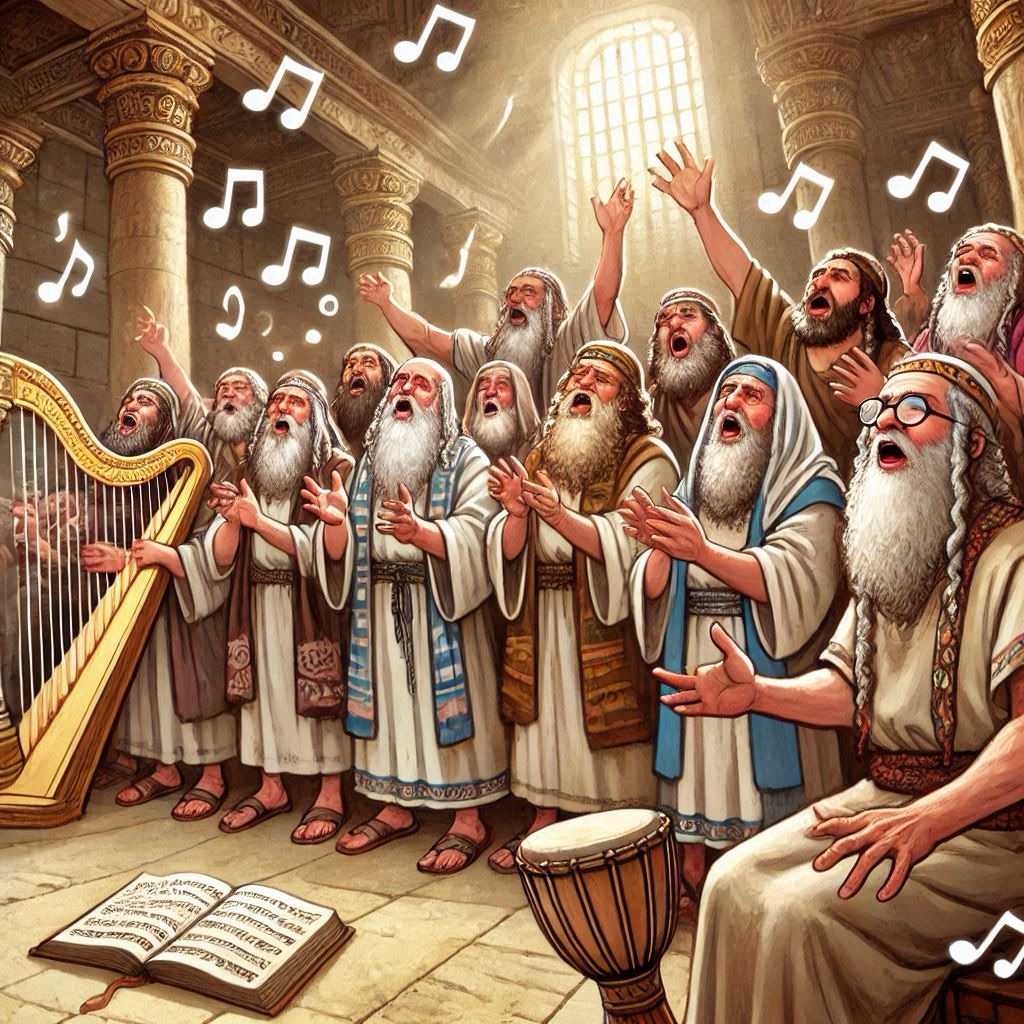Recently, I discovered a group of music albums on Spotify called “The Psalms Project”. The albums are a compilation of various music artists who have put the Psalms from the biblical book of Psalms into, well, songs. I discovered this while searching for a song that made reference to Psalm 23. Shane Heilman is the head of the project and he performs some of the songs, but he has also teamed up with other artists such as Bethany Shawn, Nathan Hitchcock, and Nick Poppins among others. The Psalms Project aims to make actual songs out of all 150 songs. The first album dropped in 2012 and the most recent album dropped in 2024, and it covers Psalms 47-55.
I have to say that listening to these have been quite a blessing. The Psalms were originally written by the ancient Israelites to be sung and listened to. These were the songs Jews would sing in worship of Yahweh in corporate settings like Temple services and, in Jesus’ day, Synagogue. And they most likely had these songs memorized as most Christians today can belt out “Amazing Grace” or “How Great Thou Art”. But these Psalms are divinely inspired, as they are in the canon of scripture and are, therefore, “God breathed” and therefore “useful for teaching, rebuking, correcting and training in righteousness, so that the servant of God may be thoroughly equipped for every good work.” (2 Timothy 3:16-17, NIV). Indeed, the Psalms contain theological insights such as the omnipresence and omniscience of God as we find in Psalm 139, announcement that the fallen members of God’s divine council that lead the nations into idolatry will be annihilated by Yahweh as we read in Psalm 82 (compare with Genesis 10-11 and Deuteronomy 32:8-9), and even some prophesies such as Jesus’ crucifixion in Psalm 22. [1]There is dispute about these, as some will argue that Psalm 22 would not have been understood by its original author and audience as a messianic prophesy. And I would agree with them on that. The … Continue reading However, the Psalms aren’t theological treatises or didactic speeches, they are songs. And far too often, we read them in the same way we might read the Sermon On The Mount (Matthew 5-7). There is theology in here, and given that it’s in the canon and The Bible is inerrant in all it intends to teach, we can refer to some verses in Psalms in support of doctrines. We can’t do the same for songs like “Amazing Grace”. Extra Biblical hymns are only as sound as the scriptural theology they allude to. Nevertheless it is easy to read the Psalms (especially in a deep study) and forget that these were meant to be sung and listened to.
When I listened to the first several of these Psalms, I read along in the book of Psalms in my Logos app. The songs stay true to the lyrical content of the scriptures they are based on. The wording was a bit different in places, but that would be the case if you read Psalms in multiple translations (NIV, ESV, KJV, NKJV, et. al.). I found myself worshipping along the Psalmist, sometimes in tears. I found myself appropriating some of the prayer songs to my own situation. Of course, so kept in mind what they likely meant to David or other Psalmists when they were written in their original setting. But as I will say in a future article, I have endured immense suffering and spiritual warfare over the past 3 years. I prayed Psalm 27, 31, and 35 with regard to my unseen enemies (Ephesians 6:12). Though, again, I kept in mind that the Psalmist himself likely had national enemies of Israel, actual human warriors rather than demons. But still, I found myself thinking of my own situation in which unseen adversaries seek my ruin. We do this all the time with modern songs. Christian or not. After a while, I found myself in tears as I mediated on the greatness and goodness of God.
I really recommend listening to this. Follow along in your translation of The Bible if you can as I did. For many years, I can recall lamenting that we really couldn’t sing the Psalms. I was like “We have the lyric sheet, but it would have been nice if we could find a manuscript with a music sheet somewhere.” While we still don’t know the tune of these Psalms, it is still nice to experience these musically. Anyone who has ever just read lyrics (especially aloud, spoken) will know that they aren’t as alive as when you actually hear them sung. I do recall another musical group making songs out of the Psalms, Yamma Ensemble, and I do prefer these musically as they have a Middle Eastern flavor to them and they are sung in the original Hebrew language) and hence, sounds more like what we might hear if we got in a Time Machine and listened to the ancient Israelites singing these. But, the downside is that if you don’t know Hebrew, you’ll have to watch the video with the subtitles they provide. You won’t be able to just put it on and listen while you’re driving or doing house work. If you do know Hebrew, you might prefer Yamma Ensemble instead.
I find it an interesting coincidence that I should discover this now. I am currently doing a study on the book of Proverbs, and when I am finished going through my “study stack” [2]which isn’t a literal stack since almost all of them are digital books and commentaries in Logos, I plan on doing a deep dive study into the book of Psalms. Perhaps this was divine providence? In any case, I definitely recommend you check out The Psalms Project. They are on Spotify and YouTube, I know. I don’t know if they are on other platforms like iTunes or not. But they also have a website that you can check out here.
References
| ↑1 | There is dispute about these, as some will argue that Psalm 22 would not have been understood by its original author and audience as a messianic prophesy. And I would agree with them on that. The original author and audience would not have understood this as referring to a dying messiah. However, I do think Sensus Plenoria should be a part of our doctrine of scripture. The biblical authors didn’t always understand the full meaning behind what they wrote down. I will caution against over-appeal to this as this has resulted in people like Hugh Ross reading Big Bang cosmology into The Bible. But when New Testament authors or Jesus comment on Old Testament passages, that’s different. Here, we have divinely inspired authors commenting on divinely inspired texts. Jesus quotes Psalm 22:1 while on the cross as we read in Matthew 27:46.
Unless Jesus forgot why he was on the cross or that believed a literal split in the Trinity had occurred, it seems Jesus was trying to draw the crowds attention to this passage. As Pastor Brandon Robbin’s points out, chapter and verse divisions were added centuries later. No one could say “Turn to the twenty second psalm” for example. Instead, they would say the first line of the passage. Jews knew their scriptures generally. They could fill in the blanks mentally just by having the first line cited. Like the Shema (Deuteronomy 6:4). “Hear O Israel, the Lord our God, the Lord is one!” A Jew could say. And the listeners’ minds would proceed “Love the Lord Your God with all of your heart, with all of your soul, and with all of your strength.” Even if they didn’t have it memorized for some reason, they could still look it up. And when they did, they would see parallels so insane that they would know that Jesus was dying as the scriptures had foretold. (See Luke 24:25-28). Moreover, the parallels between what the Psalmist describes in Psalm 22 and what happened to Jesus in the gospel accounts of his crucifixion are numerous and uncanny. See the article “5 Allusions To Psalm 22 At Christ’s Crucifixion” by Miles Custis. — https://www.logos.com/grow/5-allusions-to-psalm-22-at-christs-crucifixion/#:~:text=Psalm%2022%20stands%20out%20among,gospel%20accounts%20of%20Christ’s%20death. |
|---|---|
| ↑2 | which isn’t a literal stack since almost all of them are digital books and commentaries in Logos |
Discover more from Cerebral Faith
Subscribe to get the latest posts sent to your email.




